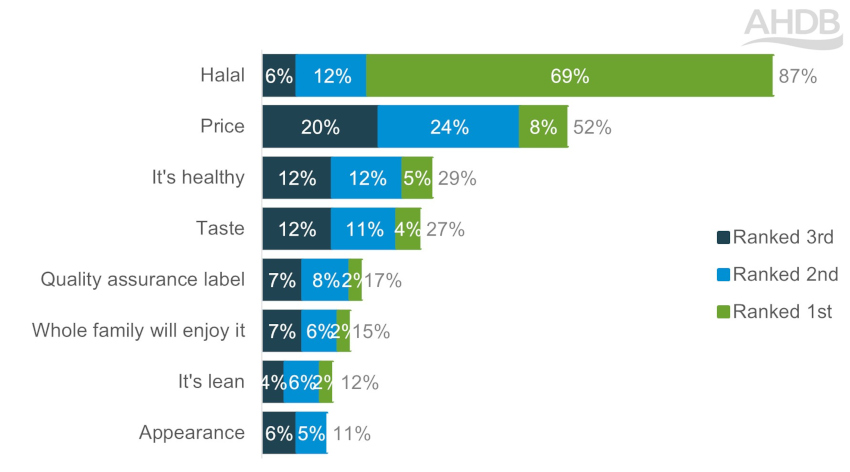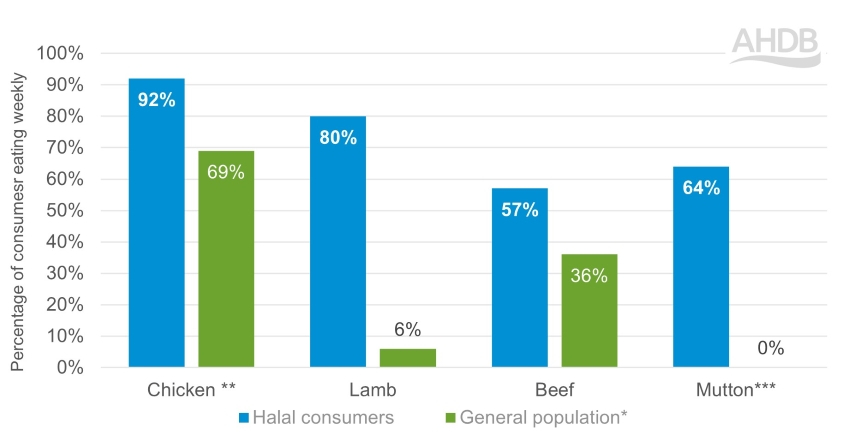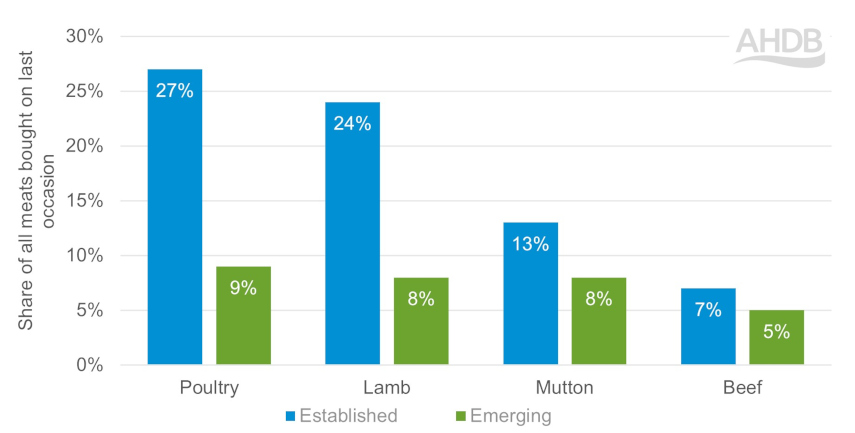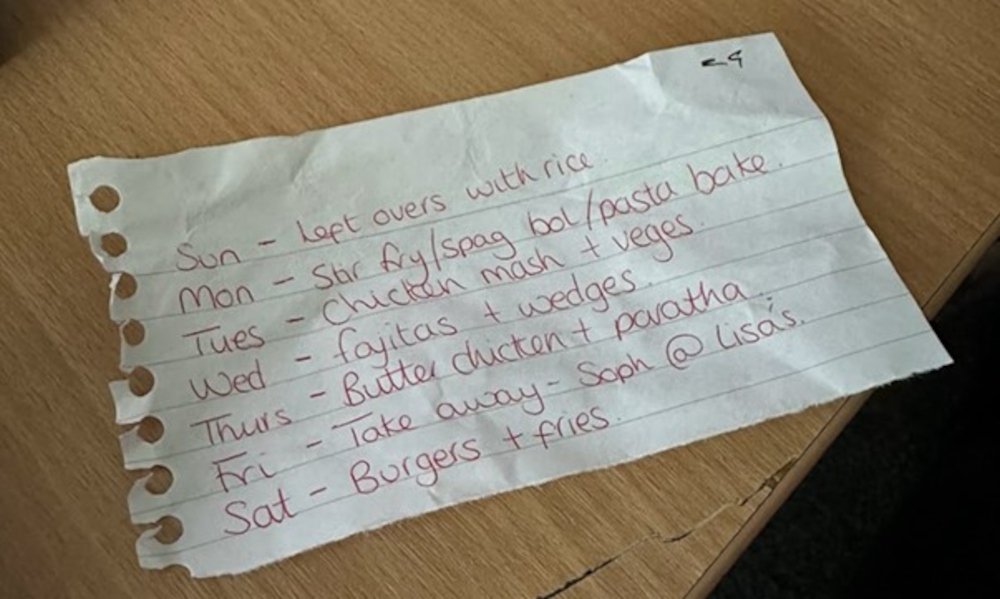- Home
- Knowledge library
- What’s most important to consumers of halal meat?
What’s most important to consumers of halal meat?
For Muslim consumers, the number one priority is for their meat to be halal, as this is a core part of their faith.
Shoppers aged over 55 years (74%) are most likely to reference their faith as the main reason for purchasing halal, according to the current research.
Price is the clear secondary factor for all when buying halal meat, followed by health, taste and quality assurance labelling (halal certification).
Halal is clearly the main driver when buying meat, but price and health are also important

In line with our previous research, halal consumers are still consuming greater volumes of meat than the general population.
When looking at specific proteins, poultry is the most commonly consumed protein each week at 92%; this compares with 69% of the general population, who eat chicken weekly.
Lamb and mutton consumption is very important to halal consumers; 80% consume lamb weekly and 64% consume mutton weekly, compared with only 6% of the general UK population eating lamb.
Beef is not consumed as frequently, but over half of halal consumers are still eating it weekly.
Halal consumers are much more likely to eat lamb weekly

Notes: *Nationally representative sample including halal consumers, **Chicken for general population compared with total poultry for halal consumers, ***Mutton consumption for general population not recorded
Lamb is culturally important to Muslims and retains a central role in their diets through family traditions and festive celebrations. It is highly regarded among Muslim families, and the older generations are used to cooking with it on a regular basis.
The most popular cuts are lamb chops and mince or, for bigger occasions, leg or shoulder. There is also high demand for mutton among Muslim consumers as this has a lower price point than lamb and can be used in a range of dishes such as curries and stews.
As seen among the general population, chicken is often chosen by Muslims for its flexibility, convenience, appeal with families and cheaper price point.
Beef is becoming more popular among younger, Emerging Muslims (see our definition of “Emerging” under ‘Two types of consumers’), who are leaning towards a more Western diet. This, like chicken, is a versatile meat, with halal consumers most likely to choose diced beef or mince for a variety of dishes.
While beef is being used in more traditional meals like curries, consumers are also cooking a range of dishes such as fajitas and spaghetti bolognese.
"My children are British Muslims; they don’t want to eat curries every night, they want spaghetti bolognese and pizza."
Male 55+, Pakistani, London
Ramadan, Eid and Qurbani: The importance of Muslim festivals
Festivals and celebrations are central to the Muslim faith. They usually involve large family gatherings and community events, with celebratory meals involving lamb.
The key festivals through the year are:
- Ramadan (a month of fasting during daylight hours)
- Eid al-Fitr (the end of Ramadan)
- Eid al-Adha (festival of thanksgiving)
- Qurbani (follows Eid prayers on Eid al-Adha where charitable acts are encouraged, particularly the sacrifice of small ruminants to be distributed among those most in need)
Like Easter, the dates of these events change each year due to the lunar calendar.
Some Emerging Muslim consumers acknowledged they don’t always have the time for a daily feast at the end of the day during Ramadan, due to busier lifestyles.
Two types of consumers
Our research revealed two segments with differing behaviours, attitudes and needs. We refer to these as Established and Emerging.
Established
The Established group have more conservative mindsets and are wedded to traditional Muslim cultures, behaviours and attitudes. These respondents typically live within well-established communities, are part of multi-generational families, first or second generation, with possibly one person in home not working and with a relatively lower income.
Established Muslims are more traditional in their shopping behaviours. They purchase more meat (as shown in the figure below, regarding meats bought on their last occasion), shop in specialist butchers rather than supermarkets and eat a more traditional diet and a variety of curries.
Established Muslims account for the largest share of lamb (and poultry), whereas beef sales are more evenly distributed

Emerging
The Emerging group have a relatively more liberal mindset and are used to operating within the Western context. These respondents are generally living independently of their families or communities. They are often third generation (but sometimes first or second generation) that have adopted Westernised lifestyles and have a relatively higher income.
Within this research, Emerging Muslims purchased less poultry and lamb than the Established Muslims; this could be an underlying trend regarding changing habits in the future. Emerging Muslims are leaning towards more Westernised diets and lead busier lifestyles; the convenience of their meals has a higher priority than for the first generation. Meals like chicken nuggets, lasagne or fajitas feature regularly during the week.
Don’t take the high level of halal meat consumption for granted
Although Muslims enjoy some form of meat with most meals and are valuable purchasers of British red meat, it’s important to be aware that they are influenced by the same underlying factors as the rest of the UK population: rising prices, health concerns, changing diet, lack of time, inability to source products, lifestyle changes, animal welfare concerns and the impact of negative press.
During the recent cost-of-living crisis, health became less of a priority for the UK population because rising prices were the top concern.
According to the latest halal research by The Smithfield Collective, while 34% of consumers are reportedly buying more halal meat than two years ago, 12% of consumers state they have reduced their halal meat purchases. This is lower than the general population in our YouGov Tracker, where 20% report they are limiting their consumption of meat.
Increased cost was the primary reason for 51% of consumers buying less halal meat versus two years ago, and health was their secondary concern at 27%.
Within the general UK population, 49% said red meat had become more expensive and 22% claimed they were cutting back for health reasons. A recent article published by AHDB, highlighted that cost, rather than health, has become a key factor for the increasing number of flexitarians in the UK.
Although Muslims consume more meat than the general UK population, they also recognise the need for a balanced diet and healthy lifestyle, which could result in them cutting back on red meat in the future in line with the general population.
Provenance of halal meat
In the latest research, provenance of halal meat did not register as a key concern for the Established Muslims, but it did for Emerging Muslims, with 32% stating it was really important to them.
This was highest among younger Muslims in higher-income households, who stated that British-reared animals are “better looked after”, “more hygienic” and “better quality”. (It must be noted that this halal research was conducted across the UK, so a bias towards domestic products would be expected.)
Respondents in the research did also refer to halal meat from Ireland, New Zealand and Australia but with less interest.
Stunned vs non-stunned
In the UK, there is much uncertainty around stunned/non-stunned halal meat within both the Muslim community and in the general population.
Improving the level of understanding around stunned halal meat would benefit the industry and improve any negative perceptions around animal welfare.



